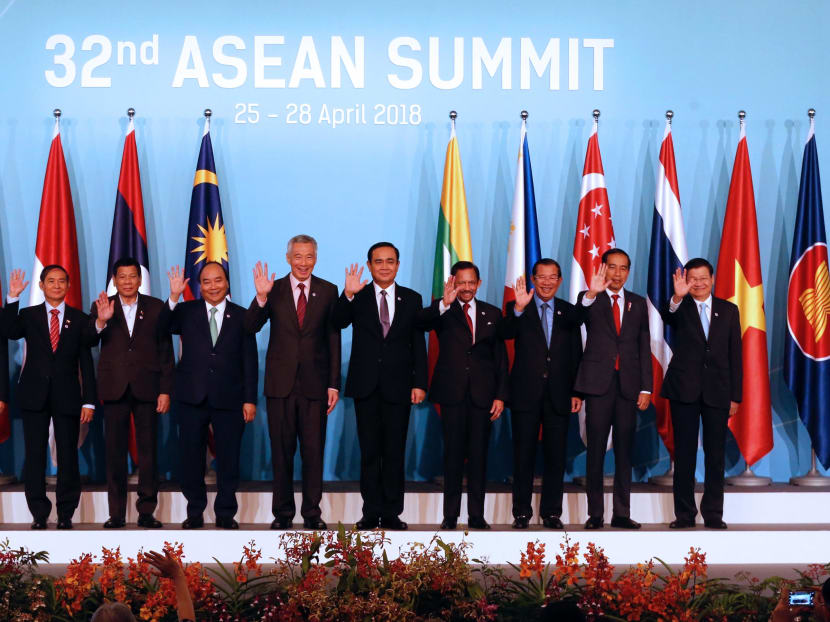Amidst major shifts, Asean needs to find fresh commitment to work together: PM Lee
SINGAPORE — With the global and regional strategic balance shifting and the rules-based multilateral trading system coming under pressure, the Association of South-east Asian Nations (Asean) has to adapt and find new areas to work together, Prime Minister Lee Hsien Loong said on Saturday (April 28).

PM Lee, seen here with other Asean leaders at the opening of the Asean Summit on Saturday morning, said that the grouping will have to react to major external trends to remain relevant.
SINGAPORE — With the global and regional strategic balance shifting and the rules-based multilateral trading system coming under pressure, the Association of South-east Asian Nations (Asean) has to adapt and find new areas to work together, Prime Minister Lee Hsien Loong said on Saturday (April 28).
"Asean countries will have to react to these major external trends," he said at the opening ceremony of the two-day Asean Summit, held at the Shangri-la Hotel in Singapore.
Mr Lee noted that the political mood in many countries has shifted against free trade, with the trade tensions between the United States and China particularly worrying.
In the region, while the growing influence of China and India has opened up new opportunities for South-east Asian countries, it also calls for astute statesmanship and deft diplomacy so that Asean member states "can be friends with all powers, old and new".
On how the 50-year-old regional grouping can stay relevant and remain central to the region's architecture, he said: "The short answer is: we need to strengthen Asean Centrality and find new areas and fresh commitment to work together."
But Asean can only maintain its centrality if it is substantial, and its members see value in the shared enterprise, he noted.
"The alternative of a looser Asean, where each member state is left to fend for itself, and goes its own separate way, will make Asean less relevant not only to its members but also its partners and other powers," he said.
"Individually, the Asean member states will find it hard to make much impact on their own. But when we speak in one collective Asean voice, we can be effective."
To that end, Mr Lee urged Asean leaders to "redouble our integration and community-building efforts", saying that it has to adapt and integrate further to remain a "central, dynamic driving force that can deal with the challenges and opportunities of the 21st century".
Singapore chose resilience and innovation as the themes for its rotating chairmanship of Asean this year as they encapsulate the current landscape, said Mr Lee.
Pointing out that resilience is needed to counter both conventional threats and non-conventional threats such as terrorism and cyberattacks, Mr Lee added that countries also need to innovate and make creative use of technology to grow its economies.
On Friday, Asean leaders adopted a joint statement articulating a common vision for a Resilient and Innovative Asean, underscoring their commitment to tackle growing uncertainties in the global strategic landscape, security challenges and technological disruption "in a coordinated, integrated and effective manner".
That statement sets out the "key principles that underpin our collective vision", identifies concrete initiatives that Asean will undertake to turn the vision into a reality and will serve as an overarching framework for the grouping's work this year, said Mr Lee.
For one, Asean leaders have reaffirmed the need to co-operate and coordinate more closely on cybersecurity through the Asean Leaders' Statement on Cybersecurity Cooperation, which Mr Lee said captures its "vision for a peaceful, secure and resilient cyberspace, which will enable economic growth, deepen connectivity and enhance living standards for all".
On top of that, Asean leaders have also agreed to launch the Asean Smart Cities Network, under which 26 pioneer cities within the region will craft city-specific action plans and innovative projects.
The initiative, which will be spearheaded by Singapore and involve cities including Johor Bahru, Phuket, Yangon, Phnom Penh and Vientiane, aims to address the challenges and impact of rapid urbanisation on issues such as city congestion, water and air quality through technological and digital solutions.
On Singapore's part, Mr Lee said that it will launch a number of initiatives to strengthen the Asean community, which include setting up the Asean Law Academy programme for officials, legal practitioners as well as educators in the region.
This annual training workshop aims to promote Asean legal integration and Asean legal education, he added.
The Singapore-Asean Youth Fund will also be renewed to promote leadership development, community service and entrepreneurship among the youth, and Singapore will provide a S$5 million top-up to achieve this goal, said Mr Lee.
"Taken together, these initiatives will position Asean for the future, and strengthen Asean's value proposition to external partners," he added.
Noting that Asean leaders will take stock of the bloc's strategic outlook and collaborations, Mr Lee said: "We will continue to press on with our integration, and deepen our web of co-operation with major partners, so that Asean remains cohesive, relevant and effective for many more years to come."






